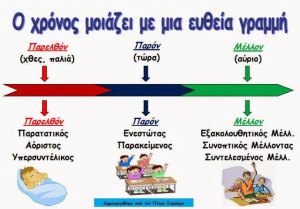Difference between revisions of "Language/Modern-greek-1453/Grammar/Voice-tense"
| Line 40: | Line 40: | ||
{| class="wikitable" | {| class="wikitable" | ||
!'''Greek tense and corresponding in English tense''' | |||
!'''correspondence''' | |||
!'''Examples''' | |||
|- | |- | ||
|'''Ενεστώτας''' : | |'''Ενεστώτας''' : | ||
| Line 115: | Line 115: | ||
I will have written / j’aurai écrit | I will have written / j’aurai écrit | ||
|} | |} | ||
Revision as of 21:14, 16 March 2021
English
The Greek Verb : Voice tense
Verbs are words that state something about the subject of the sentence and may express action, event, or condition.
The citation form of the Greek verb is denoted by the 1st person singular of the simple present tense.
The Greek verb can take many different forms which may indicate five properties: person, number, voice, tense and mood.
Person is the verb form that expresses the speaker. The Greek verb has two numbers, the singular and the plural, and three persons in each number.
There are regular and irregular Greek verbs in two voice : active and passive
Français
Le Verbe est un élément essentiel de la phrase verbale (la phrase avec un verbe) et les autres éléments s'y rattachent.
Le verbe est un mot variable qui se conjugue et qui exprime: l'action faite par le sujet, l'état dans lequel se trouve le sujet,
l'action subie par le sujet, la relation entre le sujet de la phrase et ses différents éléments.
On classe les verbes en deux voix : active et passive. Il y a des verbes grecs réguliers et irréguliers
Ελληνικά
Το ρήμα είναι κλιτό μέρος του λόγου που το χρησιμοποιούμε για να εκφράσουμε μια ενέργεια ή κατάσταση.
Είναι το κεντρικό μέρος του λόγου γιατί γύρω του χτίζουμε προτάσεις. Το ρήμα δέχεται διαφορετικές καταλήξεις
που δείχνουν για ποιον μιλάμε κάθε φορά δηλαδή δείχνουν Α’, Β’, Γ’ πρόσωπο ενικού και πληθυντικού αριθμού .
Το ρήμα έχει τρεις χρονικές βαθμίδες(παρελθόν, παρόν και μέλλον ) .Το ρήμα έχει φωνή ( ενεργητική και παθητική φωνή )
καθώς και διαφορετικούς ρηματικούς τύπους που λέγονται εγκλίσεις. Υπάρχουν ομαλά και ανώμαλα ελληνικά ρήματα.
Verbs: Types, Tenses and Moods
| Greek tense and corresponding in English tense | correspondence | Examples |
|---|---|---|
| Ενεστώτας :
simple present / présent |
Παρόν :
action in the present |
Γράφω : I write / j’écris |
| Παρατατικός :
Past Continuous / imparfait |
Παρελθόν :
action in the past (duration and repetition) |
Έγραφα :
I was writing / j’écrivais |
| εξακολουθητικός μέλλοντας :
future continuous |
Μέλλον :
action in the future (duration and repetition) |
θα γράφω : I shall be writing/
j’écrirai |
| Αόριστος : simple past / passé simple | Παρελθόν :
action in the past |
Έγραψα : i wrote / j'écrivis |
| συνοπτικός μέλλοντας :
Simple Future / Futur |
Μέλλον :
Action in future |
θα γράψω : I will write / |
| Παρακείμενος :
present perfect / passé composé |
Παρόν :
(action in the present and past) |
έχω γράψει : I have written/ j’ai écrit |
| Υπερσυντέλικος :
past perfect / Plus-que-parfait |
Παρελθόν :
action in the past |
είχα γράψει : I had written / j’avais écrit |
| συντελεσμένος μέλλοντας :
future perfect / futur antérieur |
Μέλλον :
Action in future |
θα έχω γράψει :
I will have written / j’aurai écrit |
Verb "to love" in all modes, tenses and voices
|

